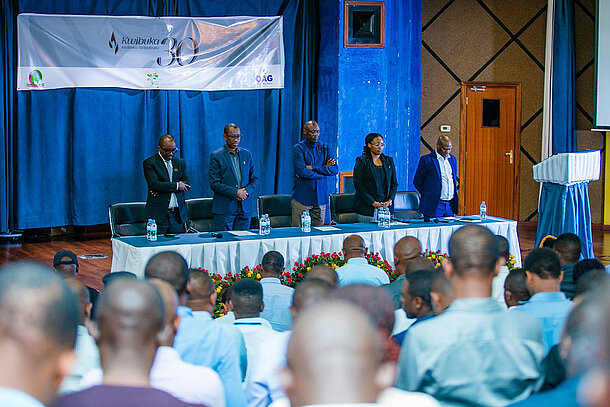
Kwibuka30: RRA Workers Remember the 1994 Genocide against the Tutsi
Employees of the Rwanda Revenue Authority (RRA), the Office of the Auditor General (OAG) and the National Electoral Commission (NEC) commemorated the 30th anniversary of the 1994 Genocide against the Tutsi.
They discussed the impact of the Genocide ideology on national security and everyone's responsibility in strengthening Rwandan unity and resilience.
In a commemoration evening on Friday, April 12, 2024, Gen. (rtd) Fred Ibingira spoke to the employees about the history of the Genocide against the Tutsi, which was organized from 1959 onwards.
He explained how the administration at that time instilled hatred and divisions. This confirms the Genocide's long-term planning. Today, denial and belittlement, often seen on social media, represent a new stage of the Genocide.
Ibingira urged the youth to stand up against those who deny the Genocide against the Tutsi or seek to return to the country and finish their plans that were halted.
"The life of our country is in your hands, especially you young people. To you survivors who lost your loved ones in the Genocide against the Tutsi, stand strong. You know that the leaders of our country stand behind you. Let's continue to remember but not be stuck in the tragic history we lived in," he continued.
Gen. Ibingira pointed out that Rwanda's strong leadership under President Paul Kagame has enabled the country to rebuild itself, ensuring that genocide cannot happen again. He asked the employees to contribute to Rwanda's continued progress and fight together for the country over prioritizing ethnicity and believe that there is a red line they can’t cross.
RRA Commissioner General, Pascal Bizimana Ruganintwali, reminded the employees of their responsibility to remember the Genocide against the Tutsi and address its consequences. He consoled the survivors, assuring them that those who stopped the Genocide remain committed to building a Rwanda that is good for everyone.
"We must always remember that the Genocide against the Tutsi is a dark stain on our nation's history, and everyone should strive for peaceful coexistence. We are obliged to teach your children to choose the good over the bad so that this country becomes a good place for our children and future generations," he continued.
Alexis Kamuhire, Auditor General of Public Finance, said the struggle to stop the Genocide should inspire lessons of courage, patriotism, and dedication to nation-building, even at the risk of death. He acknowledged that bad leadership fueled the Genocide but also the ignorance among Rwandans who participated.
However, other brave Rwandans played a crucial role in stopping it.
"During these 100 days of commemoration, it's important to recognize Inkotanyi’s immense contribution in giving us life. Without them, many of us might not exist today and Rwanda itself might not endure because after exterminating the Tutsi, the killers would likely have turned to themselves as we have seen happen somewhere,” he said.
Charles Munyaneza, the National Electoral Commission Executive Secretary, encouraged the youth to participate in building a better Rwanda, just as young people played a vital role in stopping the Genocide.
The week of mourning began on April 7 and will end on April 13, 2024, a day on which Rwandans commemorate the bravery of politicians who refused to join the Hutu Power movement.
Commemoration activities for the Genocide against the Tutsis will continue throughout all districts until June 19, 2024.
